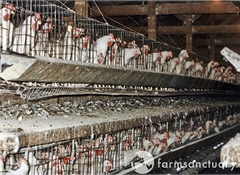Research Results
Brands at risk if eggs from cruel sources
2 Dec 11

Companies face a risk to their brands if they use eggs from battery caged hens, according to latest survey results released today by animal advocacy group SAFE.
Almost a third of respondents said they would prefer well-known companies such as Edmonds, and the Progressives and Foodstuffs supermarket chains, to stop using cage eggs.
Up to 29 per cent say they will feel worse about a company they’re buying from if they find they’re using eggs from caged hens.
The nationwide Horizon Research survey, gauging public attitudes towards the current use of battery cages, including factors that influence egg-buying, and labeling, found 79 per cent think the production practice is cruel.
In the latest results, the survey reveals significant risks companies face if they are perceived to have cruelty in their supply chains.
Respondents were surveyed on well-known brands, including, Edmonds, and supermarket chains Progressives and Foodstuffs, to ask in what way, if any, their views of their products would change if they learned the companies were using eggs from caged hens.
As many as 18.3 per cent said they would stop buying from the companies.
The results show almost a third said they would feel worse about the company, and they would prefer the company stopped using caged eggs.
Labelling is another major concern for consumers, with some egg brands not clearly labeled.
Over 80 per cent of the respondents wanted all egg cartons better labelled.
Three quarters agreed that all cage eggs should be labelled as ’Eggs from caged hens‘ and almost 60 per cent wanted production methods listed for products that contain eggs.
“We already have the example of supermarkets in New Zealand that do not sell cage eggs,” says Mr Pryor. They have experienced no drop in customer support. On the contrary, they sell as many eggs as before. Animal welfare is already a huge concern for shoppers and we believe this concern will only grow.”
When asked about choosing eggs, avoiding animal cruelty (79.4%) ranked as high as price (79.7%) as one of the two main factors influencing consumers. However, 67 per cent said that, at the time of purchase, their choice of eggs is often driven by habit and not whether they are from caged hens.
“The results show there are high risks for companies whose brands are associated with a product that is seen as coming from cruel animal production systems,” said SAFE campaign director Eliot Pryor.
As recently revealed in shocking images on the Sunday show, there are farms that do not meet animal welfare guidelines and continue to get away with it. Mr Pryor says the new research shows if a retailer were connected to farms that use cruel intensive farming practices the consequences could be significant.
“It is up to the retailer to provide their customers with a guarantee that the products they sell and their supply chain are not associated with cruelty. They need to be engaged in customer concerns, and animal welfare is a high priority.”
Data
Egg source labelling
83.6% wanted all egg carton labels to say how the eggs in them were produced. 58.5% wanted labels providing production source for eggs used in products. 74.9% agreed that all cage-produced eggs should be labelled as "Eggs from caged hens".
Factors influencing purchasing
When asked to think about and select from a list of main factors influencing their decision to buy eggs, the avoidance of cruelty, price and habit rated highly.
Avoiding animal cruelty (79.4%) ranked as high as price (79.7%), along with brand trust (61%).
However, the source of eggs is not always at the top of consumers’ minds when buying: 55.2% said they don’t really think about whether they are free range, barn or caged sourced and the choices of 67% are driven by habit.
Boycott support
Any request to boycott battery-caged hen eggs would result in significant support from consumers: Nearly four of our 10 would stop buying them.
3.8 Brand risk from cruel supply chain
Companies face a risk to their brands from being perceived to countenance cruelty in their supply chains if they use eggs from battery caged hens.
Asked in what way, if any, their views of some companies/brands or their products would change if they learned they were using eggs from cage ("battery") hen eggs, between 13.3% and 18.3% would stop buying from the five brands surveyed.
Their customers would mostly continue to buy but would prefer the companies stopped using eggs from battery-caged hens. Up to 29% said they would feel worse about the company.
The results indicate significant risk and opportunities for policy makers, egg producers, retailers and food manufacturers.
Source: Horizon Research survey of 1000 adult New Zealanders. Weighted to provide a representative population sample. Maxiumum margin of error at a 95% confidence level is +/- 3.1%.
A breakdown of the results by gender, age, income, primary household shopper or political preference, and other variables is available upon request. For results contact eliot@safe.org.nz.

TV One's Sunday programme on November 6 screened this programme featuring video shot on battery caged egg farms.
WHAT DID THE GOVERNMENT DO?
Despite overwhelming public opposition, the Government has adopted a long phase in time for colony cages. The reasons for and against this are covered in this Herald article of June 20, 2013.


